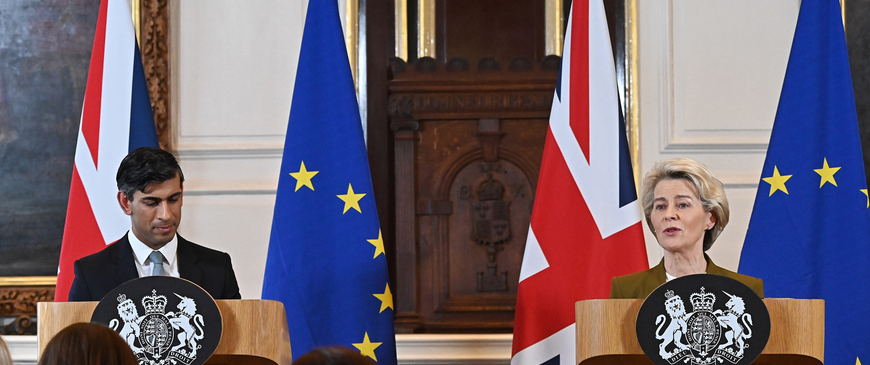
The Protocol deal is a win for Sunak – and the EU
Soon after Boris Johnson struck a deal with the EU in October 2019 on the Withdrawal Agreement, including the Northern Ireland protocol, the British government demanded changes to the Protocol. It had some strong arguments: the Protocol required checks on goods flowing from Great Britain to Northern Ireland, which inconvenienced some businesses and consumers in that region. Furthermore, the application of EU law to Northern Ireland, with the consequent role for the European Court of Justice (ECJ), threatened many Unionists’ sense of British identity. But the EU refused to make changes, arguing that in order to avoid a hard border between Northern Ireland and the Republic of Ireland, the former had to stay in the EU’s single market for goods, and that required a border in the Irish Sea.
The deadlock over the Protocol continued for three years, until today, with the announcement by Rishi Sunak and Commission President Ursula von der Leyen of the ‘Windsor Framework’. This agreement on how to implement the protocol was made possible by the EU proving more flexible than many commentators, myself included, thought likely.
The Commission accepted that not only goods going from Great Britain to Northern Ireland should pass through a ‘green channel’ with minimal checks, if that was their final destination, but also food and farm produce, too. London, not Brussels, will set rules on VAT and excise duty. Pets crossing the Irish Sea will not need passports, parcels will not require paperwork and steel will not pay tariffs. As for the ‘democratic deficit’, the Stormont assembly will be consulted on new EU laws – and it may pull an ‘emergency break’ which Sunak claimed could stop a law being applied in Northern Ireland (what that means in practice is unclear). The ECJ will remain the ultimate arbiter of EU law in Northern Ireland, but the new framework will mitigate its role (exactly how remains to be seen).
Why did the EU end up giving the UK quite a lot of what it wanted – and enough for self-styled Brexit hardman Steve Baker, a Northern Ireland minister, to proclaim the deal a ‘fantastic result’? Von der Leyen was able to lead the EU’s governments towards compromise because Sunak had succeeded in restoring an element of trust with European leaders. His two predecessors were not trusted: Johnson and Liz Truss promoted the Northern Ireland Protocol Bill which would allow the UK to tear up much of the Protocol. Many Conservatives are unaware how angry that bill made the EU: legislating to override a recently signed international treaty was seen, at best, as frivolous. If Sunak had persisted with the Bill there would have been no deal, but he parked it in the House of Lords and it will now be forgotten.
It also helped that Sunak has forged a good relationship with President Emmanuel Macron, who has always taken a hard line on Brexit. Foreign Secretary James Cleverly has done the same with Annalena Baerbock, his German opposite number, and with other EU foreign ministers.
As both Sunak and von der Leyen made clear at their press conference, the geopolitical situation mattered. The war in Ukraine has fostered good UK-EU cooperation on sanctions against Russia and made it obvious a united West would be better able to stand up to Russia and China. That was the message from President Joe Biden and he will now visit the UK for the 25th anniversary of the Good Friday Agreement in April. He would not come if there was no deal.
The Windsor Framework has strengthened its chief authors. Von der Leyen was already emerging as a powerful Commission President – probably the strongest since Jacques Delors. She has led from the front on Ukraine, pushing through ten rounds of sanctions against Russia and cajoling the member-states to make Ukraine a candidate for EU membership. The deal with Sunak is another success for von der Leyen.
Sunak is stronger, too. If he had flinched in the face of growling by the Democratic Unionist Party (DUP) and Conservative arch-Brexiteers, he would have appeared an extremely weak leader. Instead he has chalked up a success – and one which will have positive consequences. The EU will allow the UK back in to the Horizon science programme, agree to a memorandum of understanding between financial services regulators and accept more cooperation on energy. The more harmonious atmosphere could lead to closer ties in other areas too, such as climate change and foreign policy.
The Windsor Framework will stick: there is a clear majority in parliament for it (and probably even among Conservative MPs). The DUP is a party that is used to saying no, and it may continue to boycott the Northern Irish executive for a while. But it cannot stop the deal and may in time become reconciled to it, just like it eventually accepted the Good Friday Agreement.
Charles Grant is director of the Centre for European Reform.
